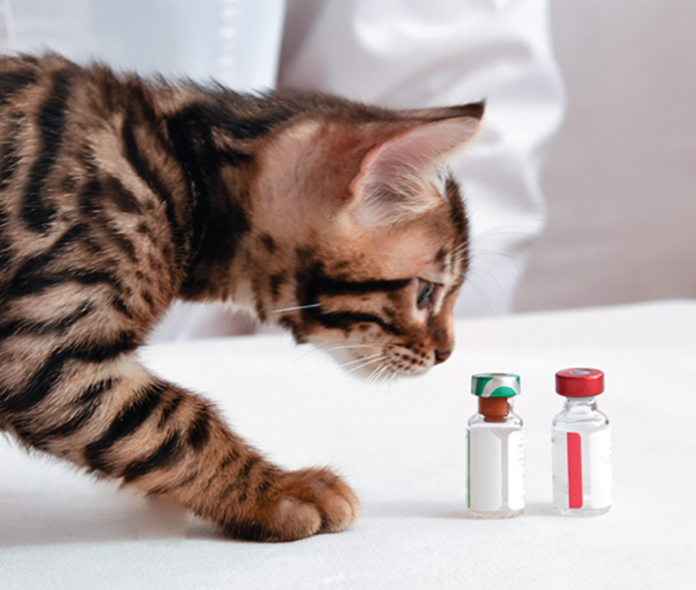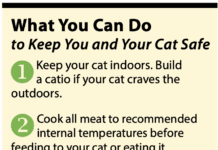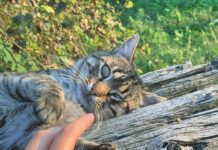All those vaccine appointments and checkups for your tiny kitten can feel excessive (and expensive), but they truly are critical. “Since all animals—and humans—are born without long-lasting protection against infection, it is super important that we give them a chance to build an immune system that can protect against infection as they age and mature,” says Leni K. Kaplan, MS, DVM. “Without vaccines, they will be susceptible to infection by a variety of infectious diseases if exposed at any point in their lives.”
Like all mammalian babies, kittens receive antibodies when they nurse at an early age. “This passive immunity is a temporary form of protection against infection where antibodies are acquired from queens, usually via colostrum/milk,” says Dr. Kaplan. “Kittens do not produce their own antibodies until they are older and have been vaccinated or exposed to infectious organisms. The protection they receive from the queens is also known as ‘maternally derived antibodies’ or MDA.”
Once a kitten’s immune system has developed, it will start producing its own antibodies in response to viruses and other invaders. This is called active immunity. Active immunity can be stimulated by exposure to a real disease, or through vaccination. Vaccination trains your kitten’s immune system to respond to threats, without the risk of getting seriously ill.
Timing Vaccinations
The tricky part is that passive immunity and active immunity don’t work well together. “If maternally derived antibodies are present, they prevent a kitten from responding to a vaccine, meaning their body will not make long-lasting protective antibodies,” says Dr. Kaplan. As long as the kitten has antibodies from mom, she will not create new ones of her own, and her immune system will not learn to recognize the relevant pathogen. Your veterinarian considers this when timing vaccinations for your kitten.
“Maternally derived antibodies persist in a kitten for several weeks, and the time they last varies from kitten to kitten. We give a series of vaccines to catch that window when the maternal protection starts to wane and when they will respond to the vaccine and can make long lasting antibodies,” says Dr. Kaplan. “If we only give one vaccine and maternal antibodies are still present, the kitten will not make long-lasting antibodies and will be unprotected from infection.”
This is why your kitten receives several rounds of a combination vaccine that typically includes viral rhinotracheitis, calicivirus, and panleukopenia (FVRCP). All these diseases are dangerous for kittens, so we want to be sure each kitten has a chance to develop their own antibodies as soon as the maternal antibodies wear off.
Even in adult cats, some vaccines only require one dose while others may require two. “We give ‘booster’ vaccines to help the immune system create a stronger, more solid long-term protection against disease,” says Dr. Kaplan. That second booster stimulates the active immune system so that if a cat is subsequently exposed to a potentially harmful infectious agent, its protective response will be more robust.
Yes, Indoor Cats Need Vaccines
Even if your cat lives indoors, she still needs to complete her kitten vaccination series and get additional vaccines as appropriate. “We can’t always anticipate when a cat may be exposed to potentially harmful infectious diseases by interacting with another cat through a window screen or catio, a new cat that is brought into the household, or while traveling with its owner,” says Dr. Kaplan. Indoor cats can also accidentally end up outside in any number of ways and are vulnerable to disease if they have not been vaccinated.
Rabies vaccination is critical for all cats regardless of lifestyle. “Rabies vaccination is a must for indoor cats because of potentially infected wildlife that can get into the house (like bats), and because humans can contract this lethal virus,” says Dr. Kaplan. “Getting your cat vaccinated against rabies protects humans as well as cats from rabies.”ν
The Timing of Kitten Vaccines
Kittens can receive their first FVRCP vaccine as young as 6 weeks of age. Many kittens still have passive immunity from maternal antibodies at this age, but some kittens have already lost them and are vulnerable.
Once the vaccine series starts, the kitten should get boosters of the FVRCP vaccine every three to four weeks until she is between 16 and 20 weeks old. This is the age when most kittens no longer have maternal antibodies and have immune systems capable of developing their own active immunity from the vaccination.
The rabies vaccine only needs to be given once after the kitten reaches 12 weeks of age, until the following year.
The vaccine for feline leukemia virus is typically given twice, three to four weeks apart, starting at 8 weeks of age or later.
Leni K. Kaplan, MS, DVM, is a senior lecturer at Cornell University’s College of Veterinary Medicine.
Nynke van Holten | iStock




